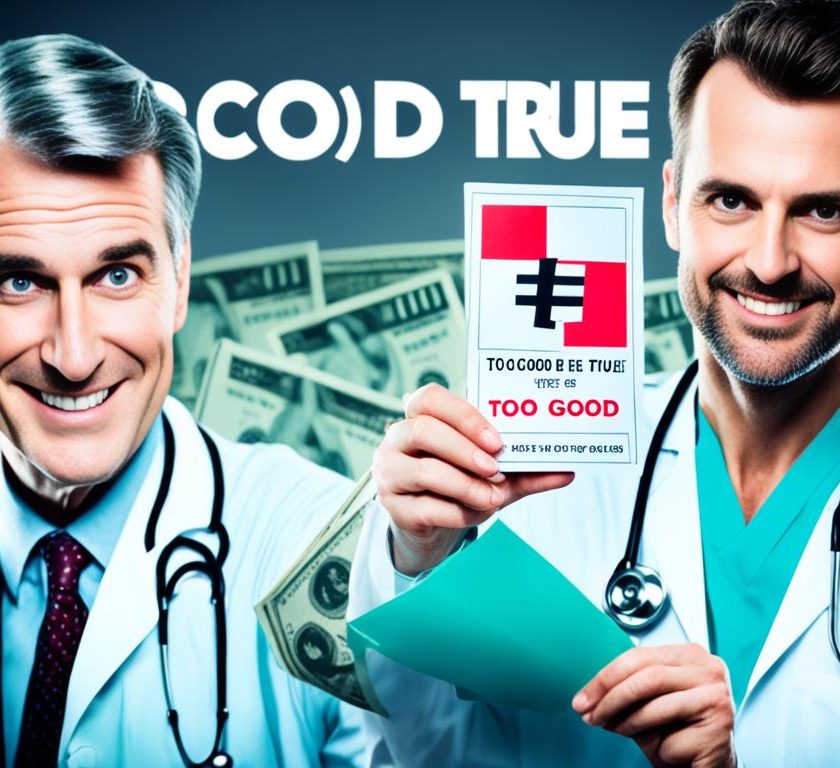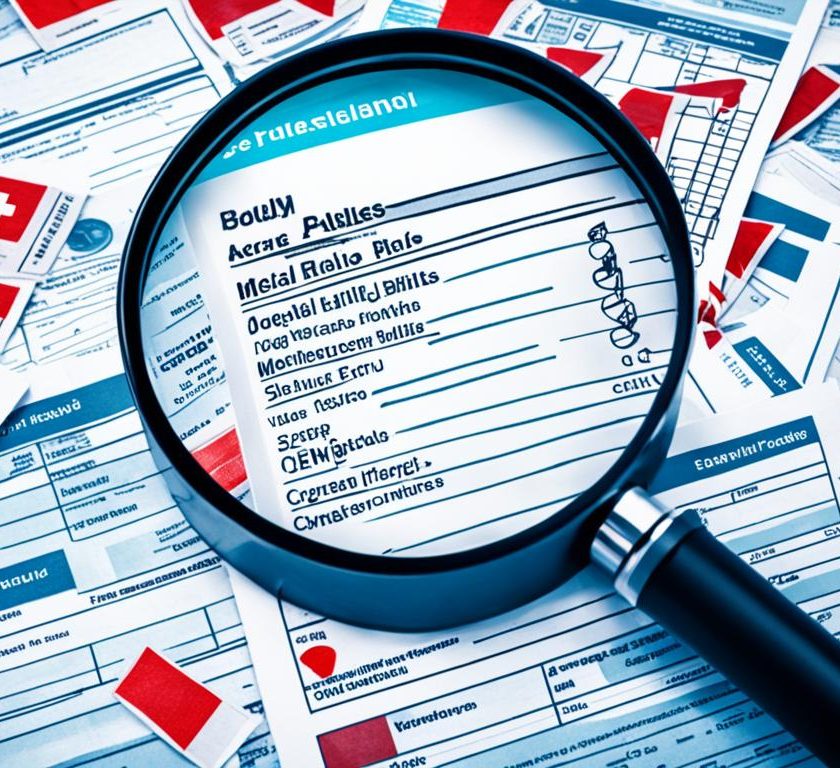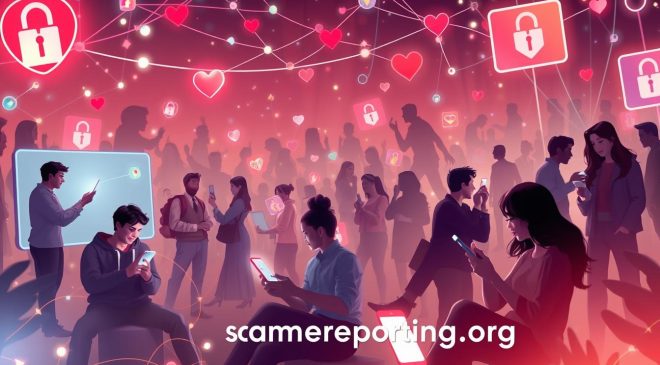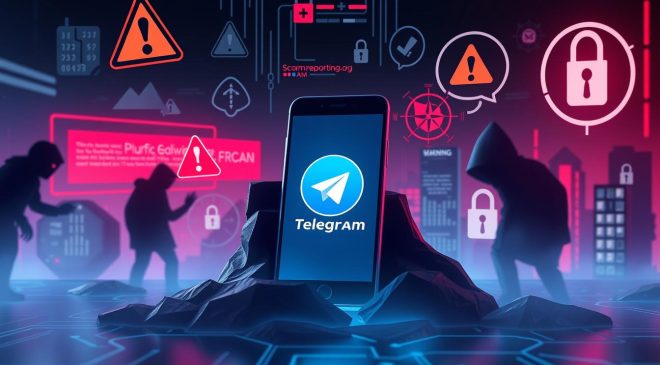
Imagine you’re at home, resting after a surgery. Suddenly, the phone rings. A person claims to be from your doctor’s office, talking about a payment issue. Your heart starts racing. Could this be a scam? With healthcare fraud and medical scams on the rise, it’s key to be vigilant. Your money and health safety depend on it.
Last week, Sarah, a retiree from Florida, fell for a doctor payment scam. She got a call about a “urgent billing matter” for her hospital visit. The caller knew her treatment details, making it seem real. Sarah gave her credit card info, losing $5,000.
Sarah’s experience is not rare. Healthcare fraud is increasing, targeting many patients in the U.S. These scams use your trust in doctors to threaten your money and health. We’ll look at ways to shield yourself from these scams and keep your finances safe from healthcare fraud.
Key Takeaways
- Doctor payment scams are becoming more common and sophisticated
- Scammers often have detailed knowledge about your medical history
- Never provide financial information over the phone without verification
- Be cautious of urgent requests for payment from healthcare providers
- Protect your personal and medical information to prevent fraud
- Report suspicious activity to your healthcare provider and authorities
- Stay informed about common healthcare fraud tactics to protect yourself
Understanding the Doctor Payments Scam
Doctor payment scams are a big worry in healthcare today. These scams trick patients and insurance companies, causing financial loss and hurting trust in doctors.
What is a Doctor Payments Scam?
A scam here means fake doctors or wrong billing. They try to trick patients or insurance for money. This hurts patients and can have big effects on victims.
Common Tactics Used by Scammers
Scammers use many ways to scam:
- Fake medical billing: Charging for services not given
- Insurance fraud schemes: Making false claims to insurance
- Prescription drug scams: Getting and selling drugs illegally
Why Healthcare is a Target for Fraudsters
Healthcare is easy prey for fraud because it’s complex and deals with sensitive info. Crooks see this as an opportunity:
| Factor | Percentage |
|---|---|
| Healthcare professionals approached for illegal payments | 10% |
| Increase in doctor payment scams (last 3 years) | 15% |
| Healthcare providers approached with fraudulent offers | 20% |
| Hospital billing fraud cases involving illegal referral payments | 25% |
These numbers show how common healthcare scams are. Knowing about these scams helps you stay safe from doctor payment scams and other medical fraud.
Red Flags to Watch Out For

Being alert can help you avoid doctor payment scams. Fraud can show up in unexpected ways, so it’s important to be aware. Look out for billing that seems strange.
Watch for these warning signs:
- Bills for services you don’t remember receiving
- Charges that seem unusually high
- Pressure to pay immediately without explanation
- Requests for unnecessary personal information
If something seems off, trust your gut. Ask questions about any unusual charges. Legit healthcare providers will explain your bill clearly.
“I noticed a charge for a procedure I never had. When I called to ask about it, they couldn’t give me a straight answer. That’s when I knew something was wrong.”
Check your medical records and insurance statements often. This can help catch problems early. If you find any errors, tell your insurance company and healthcare provider right away.
By staying informed and careful, you can protect yourself from healthcare scams. Your health and money are too important to risk.
Types of Doctor Payment Scams
Doctor payment scams have many forms, each aiming to exploit healthcare system weaknesses. Knowing about these scams can help protect you and your family. It’s key to stay alert and informed to avoid falling into these traps.
Insurance Fraud Schemes
Insurance fraud is a big problem in healthcare. Scammers might bill for services you didn’t get or make up the costs of treatments. They could also do unnecessary procedures to make more money. Always check your insurance statements for any strange or high charges.

Fake Medical Billing
Medical billing scams are another trick fraudsters use. They might send fake bills for services you didn’t receive or charge too much for real treatments. Always compare your medical bills with your insurance statements. Keep good records of your healthcare visits.
Prescription Drug Scams
Pharmaceutical scams are dangerous for your health and wallet. Scammers might sell fake drugs or prescribe drugs you don’t need for profit. Be careful of doctors who only talk about one brand of drug without offering alternatives. If a prescription seems off, get a second opinion.
| Scam Type | Warning Signs | Prevention Tips |
|---|---|---|
| Insurance Fraud | Unexplained charges on statements | Regularly review insurance claims |
| Fake Medical Billing | Bills for services not received | Keep detailed healthcare records |
| Prescription Drug Scams | Pressure to use specific medications | Consult multiple healthcare providers |
Learn about these scams to protect yourself from financial and health risks. If you think you’re a victim of a scam, report it to the right authorities right away.
How Scammers Exploit Patient Trust
Scammers take advantage of patient vulnerability to commit fraud. They use the trust patients have in healthcare providers to manipulate and deceive. Knowing these tactics can help you stay safe and avoid scams.
One way scammers work is by using emotional manipulation. They try to make you act fast, playing on your health fears. They might say a treatment is urgent or you’ll miss a special deal if you wait.
This rush tactic tries to make you doubt and not think things through. It’s all to get you to agree without checking the treatment or service well.
Scammers also exploit trust by breaking medical confidentiality. They might say they know your medical history or personal info. This makes you trust them more, even if they don’t have the right to your information.
They might use your past health issues to seem trustworthy. But, they could have gotten this info illegally.
Scammers also use your lack of medical knowledge against you. They talk about complex medical terms or fake studies to confuse you. They hope you’ll trust them because they seem like experts.
“I paid money to several scammers who promised guaranteed auditions and acting opportunities. They introduced me to fake directors and producers as part of their deceptive tactics.” – Lovekesh Solanki, actor
Like Lovekesh Solanki in the entertainment world, healthcare scammers target those new to the field. They promise quick fixes or special access to services. Knowing these tricks can help you avoid healthcare fraud.
The Impact of Doctor Payment Scams on Patients
Doctor payment scams can deeply affect victims, hitting their finances, health, and emotional well-being hard. Let’s look at how these scams can change the lives of unsuspecting patients.
Financial consequences
These scams can cause big financial losses. Victims often lose about $5,000 each time, hurting their credit scores and causing long-term money problems. Over the past year, there’s been a 20% jump in investigations, showing how big a threat these scams are to patients’ money.
Health risks and complications
Scams can also harm your health. Patients might get treatments or meds that aren’t needed, risking their health. The fear of scams has made patients less happy with their healthcare, with a 15% drop in satisfaction ratings.

Emotional toll on victims
Scams also take a toll on people’s feelings. Victims feel anxious, stressed, and lose trust in healthcare. Sadly, 80% of those scammed feel less trust in their doctors, making going to the doctor harder in the future.
| Impact | Statistics |
|---|---|
| Average financial loss | $5,000 per incident |
| Increase in investigations | 20% in the last year |
| Decrease in trust | 80% among victims |
| Patient satisfaction decline | 15% in affected facilities |
Getting over a scam is hard and takes time. Victims face not just financial losses but also need to regain trust in healthcare. Support groups and counseling are key in helping people deal with the emotional effects of these scams.
Legal Implications and Reporting Procedures
It’s key to know your rights and the legal steps for doctor payment scams. Reporting fraud is crucial to stop these schemes. If you think there’s fraud, act quickly.
You have ways to protect yourself legally. Report fraud to your insurance, state medical board, or federal agencies like the FBI. These groups work together to catch and punish healthcare fraud.

Fighting fraud is showing good results. Here are some important facts:
| Metric | Value |
|---|---|
| Successful prosecutions ratio | 65% |
| Annual reported scams | 5,000+ |
| Average victim loss | $3,500 |
| Whistleblower-identified scams | 40% |
Reporting fraud helps protect you and others. By being alert and reporting fraud, you help fight healthcare fraud.
Protecting Your Personal and Financial Information
In today’s digital world, keeping your personal and financial data safe is key. With cyberattacks on Indian websites going up by 261% in early 2024, protecting your data is more important than ever. Let’s look at some ways to keep your information secure.
Safeguarding Your Medical Records
Your medical records are very private. Always use strong, unique passwords for health-related accounts. Check your records often for any changes you didn’t make. Remember, India saw a 46% jump in cyberattacks, with about 3,201 each week in 2024.
Secure Payment Methods
When paying for healthcare, choose secure ways. Use credit cards or encrypted online systems. Don’t share your financial info on unsecured networks. With recent attacks like WazirX’s $230 million theft, keeping payments safe is crucial.
Being Cautious with Online Health Portals
Online security is crucial for health portals. Always check the site’s true identity before logging in. Don’t click on suspicious links from emails that seem to be from your healthcare provider. Remember the boAt data breach that exposed 7.5 million users’ info? Always be on your guard!
| Sector | Average Weekly Attacks |
|---|---|
| Education and Research | 3,341 |
| Government and Military | 2,084 |
| Healthcare | 1,999 |
By following these tips, you can greatly lower your risk of data breaches and financial scams in healthcare. Stay informed and stay safe!
Verifying Healthcare Provider Credentials
Protecting yourself from scams starts with checking your doctor’s credentials. This step makes sure you’re working with real healthcare pros. Let’s look at how to check if a doctor is legit and verify their medical license.
First, search for your doctor online. Check their name on state medical board websites. These sites list all licensed doctors and any issues they’ve faced. It’s an easy way to start checking credentials.
Then, confirm their medical license with the state board. Each state has a database to check a doctor’s credentials. This step is key for knowing if a doctor is real and for feeling secure.
- Check the provider’s educational background
- Verify board certifications in their specialty
- Look for hospital affiliations
- Read patient reviews and ratings
Don’t be shy to ask your doctor about their qualifications. Real doctors are happy to share their background and experience. This shows they’re professional and care about patients.
Remember, checking a doctor’s credentials is your best defense against scams. By doing this, you protect your money and your health.
Doctor Payments Scam: Real-life Case Studies
A major data breach hit the healthcare industry, one of the biggest in recent times. Change Healthcare, a key player in billing and insurance, was hit by a ransomware attack. This shows how vulnerable our healthcare system is and the big fraud risks.
The ALPHV/BlackCat gang was behind this cyber attack. They claimed to have taken sensitive health info of millions of Americans. With Change Healthcare handling data for about one-third of the U.S., over 100 million people could be affected. This shows how big healthcare fraud can get in our digital world.
By late July, Change Healthcare started telling people about the breach. The stolen data could lead to many frauds, putting millions at risk of losing money and their health info. This case shows how important strong cybersecurity is in healthcare and for everyone to stay alert.
The legal steps after this breach are still being taken. It’s a big warning for the healthcare industry. As we move forward, we’ll see more focus on fighting these threats with new tech and strategies. It’s more important than ever to protect your health info.
FAQ
What is a doctor payment scam?
A doctor payment scam is when scammers pretend to be healthcare workers or mess with medical billing. They do this to trick patients or insurance companies out of money.
What are some common tactics used by scammers?
Scammers often use fake medical bills, insurance fraud, and scams about prescription drugs.
Why is the healthcare industry a target for fraudsters?
The healthcare industry is easy for fraudsters to target because it’s complex and has a lot of sensitive patient info.
What are some red flags to watch out for?
Be wary of unexpected bills, charges for services you didn’t get, being rushed to pay right away, or being asked for too much personal info.
What are some types of doctor payment scams?
Common scams include insurance fraud, fake medical billing, and scams about prescription drugs.
How do scammers exploit patient trust?
Scammers use emotional tricks, pressure, or take advantage of patients’ lack of medical knowledge to gain trust.
What are the potential impacts of doctor payment scams on patients?
Scams can lead to losing money, getting unnecessary treatments or fake meds, and causing emotional stress.
What are the legal implications, and how can patients report suspected fraud?
Patients should know their rights and how to report fraud. They should contact law enforcement and healthcare regulators.
How can patients protect their personal and financial information?
Keep medical records safe, use secure payment ways, be careful with online health sites, use strong passwords, and watch your bank statements to prevent fraud.
Why is verifying healthcare provider credentials important?
Checking if healthcare workers are legit by looking at their licenses and affiliations helps make sure you’re getting real medical care and avoids scams.


